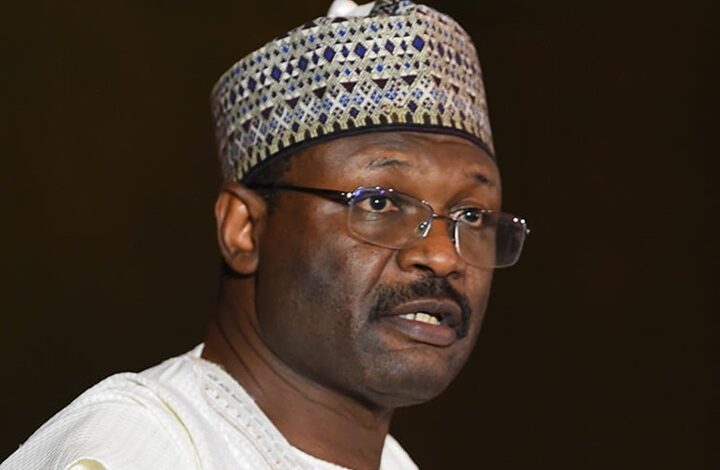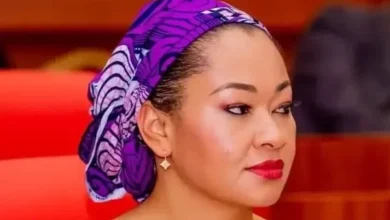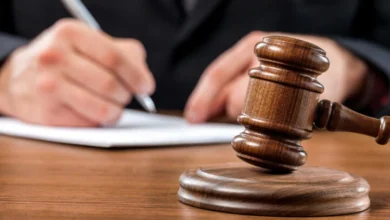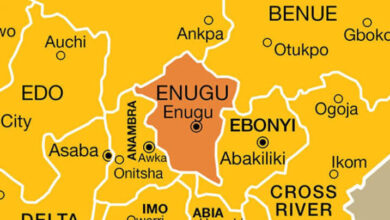INEC Chairman’s Disdain for Court Judgement: Why Mahmood Must Be Held Accountable

This article is an expansion of the previous article “INEC’s Disobedience To Court Judgments & Doctrine of Unlawful Exclusion Under Electoral Act 2022“.
1. In 1937, at 31, Dietrich Bonhoeffer, a German Theologian wrote a starling book ‘The Cost of Discipleship’ – clearly, the book is a theological and ethical classic that challenged German – Christians and the Church to live out a radical, authentic faith by challenging the German Nazi. Bonhoeffer wondered why the Church should adopt complacency and comfort in the face of rampaging injustice.
2. He opined that grace is free but not cheap; discipleship demands obedience, sacrifice, and real transformation. Bonhoeffer’s theology was shaped by his experiences in Nazi Germany, where he witnessed the failure of German Christianity to resist the Nazi regime. He emphasized that when Christ calls someone, He calls them to ‘come and die’—to die to self-will, self-security, and worldly attachments.
3. Ten years later (1947), Albert Camus, in his book ‘The Plague’ – an allegorical novel set in the Algerian city of Oran – is a meditation on how the author’s philosophy of the absurd—the tension between humanity’s search for meaning and the universe’s indifference.
The Plague is not just about disease—it is about resistance, solidarity, and the moral imperative to act in the face of suffering and absurdity. Camus teaches that while we cannot conquer death or eradicate evil forever, we can preserve human dignity by refusing indifference and by standing together against injustice.
4. In Nigeria, the fundamental fault line in our development is traceable to the dysfunctionality of two great institutions – Independent National Electoral Commission (INEC) and the Judiciary.
5. Unarguably, these two great institutions serve as the optical prism through which potential investors and the international community view the country. Therefore, the leadership selection process and the justice system determine the success, progress or otherwise of any country.
6. In the past two years, retiring Justices in the Temple of Justice have turned their valedictory sessions into an arena for introspection of our judiciary. One dominant proposition had been the call for integrity, impartiality and neutrality in the judiciary.
7. During his valedictory speech, Justice Musa Muhammad Dattijo (JSC), lamented what he described as the unpredictable nature of recent decisions of Nigerian courts, saying the judiciary he exited ‘is far from the one l voluntarily joined and desired to serve and be identified with.’
Dattijo’s concern was about the judgment which the Supreme Court delivered in the two cases – Ahmed Lawan, the former President of the Senate and the Imo governorship appeal, involving Sen. Hope Uzodinma.
8. Justice Dattijo said: ‘It is difficult to understand how and where, by these decisions, the judicial pendulum swings. It was not so before, they contend. In some quarters, the view is strongly held that filth and intrigues characterize the institution these days!
“Judges are said to be comfortable in companies they never would have kept in the past. It is being insinuated that some judicial officers even campaign for the politicians. It cannot be more damnifying.’ He concluded that ‘the judiciary must be uniquely above board’.
9. In the similar vein, Justice Oludotun Adefope-Okojie (JCA), a retired Justice of the Court of Appeal warned that Nigeria’s hopes for economic recovery and global competitiveness will remain a mirage without urgent reforms in the judiciary. ‘Nobody will invest in a country with a bad judiciary. Investors will not put their money where the courts cannot guarantee fairness, speed, and independence.’
10. She further warned that ‘a compromised judiciary is not only a legal tragedy but also an economic disaster,’ adding that without strong institutions of justice, both foreign direct investment (FDI) and local enterprise will continue to dwindle.
11. Evidently, the boldness in bringing these conversations to the public is an indication that the judiciary is on the path of self-healing so that it can serve the country better and be part of its evolution and advancement.
12. However, what the members of the Bench have not taken seriously is the flagrant disobedience to court judgment. Each time a public office holder disobeys a Court Order/Judgment he reduces the legal profession and the entire judiciary into a circus show. Nothing threatens the very fabrics of a nation than disobedience to court judgment.
13. Painfully, INEC under Mahmood has gained notoriety for disobedience to Court Order and Judgment. By disobeying Court judgments, what Mahmood is telling the judiciary is that he has the powers to select which judgment to obey or disregard.
14. The case of the National Rescue Movement (NRM) in Suit No (FHC/ABJ/CS/45/2025 between the National Rescue Movement (NRM) Vs. the Independent National Electoral Commission (INEC) and the Commission’s disregard for the Judgment delivered by His Lordship Justice Obiora Atuegwu Egwuatu on March 5, 2025, ordering INEC to recognize the National Executives that emerged from the Emergency National Convention on January 17, 2025, is troubling.
15. Observably, the Commission was a party to the suit and was duly represented throughout the litigation. It is therefore baffling that Mahmood has allowed his personal strife and contradictions to override the Commission responsibility, thereby nailing the neutrality, impartiality and integrity of the Commission on the cross.
16. The question that no one is asking Mahmood is how he came about the name he inserted in the INEC portal as the governorship candidate of NRM, in the forthcoming Anambra governorship election?
The logic is simple, since you refused to obey the court judgment which ordered the commission to recognize the National Executives that emerged from the Emergency National Convention of January 17, 2025, who then, are you recognizing? And on what grounds? How did you come about the NRM Governorship candidate?
Bear in mind that the name of the purported governorship candidate for NRM had already been uploaded before Mahmood proceeded on Leave to Appeal at the Court of Appeal Abuja. Shamefully, the Leave for Appeal was done after the Mahmood has exhausted the 90 days statutory window for appeal permissible by the law. Again, the question begging for answer is, whose bidding is Mahmood serving?
17. Notably, in 2022, in the foreword for the ‘Guidelines for Nomination of Candidates for Elections’, Mahmood observed that ‘the nomination of candidates is a statutory requirement for the conduct of elections. Such candidate(s) must have emerged from validly conducted political party primaries.’
This statement chronicles Section 84 of the Electoral Act, 2022, which mandates strict adherence to due process in the sponsorship and nomination of candidates.
18. Flowing from the above, Mahmood should be ready to make the following documents public;
- The Nomination Form of the NRM Governorship Candidate as submitted via the INEC Candidates Nomination Portal (ICNP).
- The completed Form EC9 (Affidavit in Support of Personal Particulars) and Forms EC9(A–G) as uploaded by the National Chairman of the Party.
- The electronically signed versions of Forms EC9(A–G) endorsed by the National Chairman and National Secretary of the NRM.
- The official email(s) communication between the Commission and the NRM through the ICNP.
- The completed Forms EC13(A–G) uploaded by the National Chairman, confirming the Party’s sponsorship of the Candidate.
- The Cover Letter nominating the Party’s Candidate, duly signed by the National Chairman and National Secretary.
- The NRM National Chairman’s acknowledgement/acceptance letter confirming receipt of INEC’s Code/Key for uploading candidate details.
19. Pertinently, the INEC handbook on elections ‘The Guidelines for Nomination of Candidates for Elections’ which is redacted from the Electoral Act, 2022 explicitly states that a governorship candidate must be sponsored by a political party; and also, it was specific that the supporting documents for sponsoring such a candidate must be signed by the National Chairman of the party.
20. If the candidate of a political party was nominated outside the provisions of law, such process is not only flawed but has damning consequences and dire implication on the election. Outrightly, it amounts to unlawful exclusion.
21. By simple definition, unlawful exclusion occurs when a candidate, validly nominated by a political party, is wrongly excluded from participating in an election by the Independent National Electoral Commission (INEC). It is even more complicated and has far reaching implication when INEC chooses a candidate for a political party.
22. The Electoral Act 2022, stipulates grounds upon which exclusion can occur:
- Failure of INEC to publish the candidate’s name on the final list of candidates.
- INEC refusing to accept or recognize a candidate’s validly submitted nomination.
- Refusal to include a political party or its candidates in the ballot despite compliance with all legal requirements.
23. Consequently, there are other legal grounds upon unlawful exclusion can occur as contained in Section 29(1)– (3) of the Electoral Act, 2022;
- Parties must submit names of candidates that emerged from valid primaries.
- INEC is legally bound to publish them.
24. Instructively, Section 84(13) harps on the Effect of invalid primaries as grounds for unlawful exclusion;
- If a candidate did not emerge from a valid primary, the party risks exclusion. But if the primaries were valid, INEC has no discretion to exclude the candidate.
25. There are a plethora of Judicial Interpretation and Notable Cases that lay credence to unlawful exclusion;
- In the case of Action Congress v. INEC (2007) 12 NWLR (Pt. 1048) 220, The Court of Appeal held that once a candidate is validly nominated, INEC has no power to reject or disqualify the candidate. Any exclusion by INEC is unlawful.
- In the case of PDP v. Sylva (2012) 13 NWLR (Pt. 1316) 85 (SC) Supreme Court emphasized that the right to sponsor a candidate belongs exclusively to a political party. If INEC excludes such a candidate, it violates the law.
- And in the case of Labour Party v. INEC (2011), the Court reaffirmed that unlawful exclusion is a sufficient ground to invalidate an election, provided the petitioner proves valid nomination.
26. The law frowns at unlawful exclusion because it undermines democracy and denies voters the right to freely choose among all lawfully sponsored candidates.
27. Insightfully, under the Electoral Act, 2022, unlawful exclusion occurs when INEC wrongfully prevents a validly nominated candidate from contesting. It is a statutory ground for election petitions under Section 134(1)(d), and Nigerian courts have consistently ruled that INEC has no power to unilaterally exclude validly nominated candidates.
28. Given this flood of evidence, it behooves on Mahmood to come out clean and explain to discerning public why he had to choose a candidate for a political party.
29. The Commission has remained on this evil trajectory for too long and because it has remained unchecked and unchallenged, INEC assumes that it has the capacity to steer our destiny to any direction. The resultant effect is that the Commission lures Nigerians into an election that has been pre – rigged; making each electoral cycle a sort of horrendous nightmare
30. Horrifying elections do not just happen. They are intentionally crafted and deliberately orchestrated by INEC high command. The election day is merely a rehash of what has been contrived.
31. Therefore, holding INEC accountable for its disobedience to Court Judgment is a compelling task. This civic duty will reinforce and realign us on the path of the notable quote attributed to Thomas Jefferson, the third President of the United States, that ‘the price of freedom is eternal vigilance’.
32. Surely, we, at NRM will leverage on this incident to set a template for holding INEC accountable.
By Okoro Chinedum Benedict is the National Administrative Secretary of National Rescue Movement (NRM).
Post Views: 163





